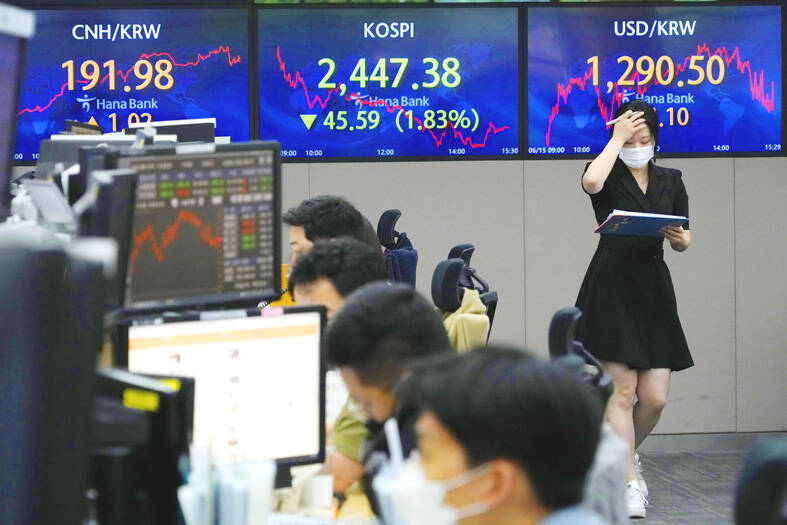Morgan Stanley’s stock short-selling practices are being inspected by South Korea as part of a broader effort by the nation’s financial watchdog to clamp down on bets against equities, a person familiar with the matter said.
The Financial Supervisory Service (FSS) also plans to examine Bank of America Merrill Lynch over how it conducts stock short sales, said the person, who asked not to be identified because they cannot comment on an ongoing probe.
Morgan Stanley was picked due to the New York-based bank’s big influence in the market, the person said.

Photo: AP
A Morgan Stanley spokesperson declined to comment, as did Bank of America spokesman Mark Tsang.
South Korea restricts some types of short-selling activities even after doing away with most curbs in May last year and allowing investors to sell borrowed shares on the KOSPI 200 Index and the small-cap KOSDAQ 150. Stocks on the two indices represent almost 90 percent of KOSPI’s market value.
The nation introduced a ban in early 2020 to tame markets hit by the COVID-19 pandemic.
Foreign investors accounted for about 70 percent of short-selling by trade on the benchmark KOSPI this month, Korea Exchange data showed.
Morgan Stanley is the biggest short-seller in South Korea, accounting for about 18 percent.
FSS Governor Lee Bok-hyun said in a meeting yesterday that the nation would set up a team to investigate stock short-selling to root out illegal and unfair trades.
Since prosecutor-turned-President Yoon Suk-yeol took office earlier this year, authorities have increased their calls to stamp out naked short sales, a practice of selling stocks without borrowing them first, and other types of illegal short-selling.
In 2018, Goldman Sachs International was fined 7.5 billion won (US$5.5 million) for selling 156 South Korean stocks without borrowing the securities as required by law, which the bank said was an error by a company employee.
The inspection was earlier reported by MoneyToday.

With an approval rating of just two percent, Peruvian President Dina Boluarte might be the world’s most unpopular leader, according to pollsters. Protests greeted her rise to power 29 months ago, and have marked her entire term — joined by assorted scandals, investigations, controversies and a surge in gang violence. The 63-year-old is the target of a dozen probes, including for her alleged failure to declare gifts of luxury jewels and watches, a scandal inevitably dubbed “Rolexgate.” She is also under the microscope for a two-week undeclared absence for nose surgery — which she insists was medical, not cosmetic — and is

CAUTIOUS RECOVERY: While the manufacturing sector returned to growth amid the US-China trade truce, firms remain wary as uncertainty clouds the outlook, the CIER said The local manufacturing sector returned to expansion last month, as the official purchasing managers’ index (PMI) rose 2.1 points to 51.0, driven by a temporary easing in US-China trade tensions, the Chung-Hua Institution for Economic Research (CIER, 中華經濟研究院) said yesterday. The PMI gauges the health of the manufacturing industry, with readings above 50 indicating expansion and those below 50 signaling contraction. “Firms are not as pessimistic as they were in April, but they remain far from optimistic,” CIER president Lien Hsien-ming (連賢明) said at a news conference. The full impact of US tariff decisions is unlikely to become clear until later this month

GROWING CONCERN: Some senior Trump administration officials opposed the UAE expansion over fears that another TSMC project could jeopardize its US investment Taiwan Semiconductor Manufacturing Co (TSMC, 台積電) is evaluating building an advanced production facility in the United Arab Emirates (UAE) and has discussed the possibility with officials in US President Donald Trump’s administration, people familiar with the matter said, in a potentially major bet on the Middle East that would only come to fruition with Washington’s approval. The company has had multiple meetings in the past few months with US Special Envoy to the Middle East Steve Witkoff and officials from MGX, an influential investment vehicle overseen by the UAE president’s brother, the people said. The conversations are a continuation of talks that

CHIP DUTIES: TSMC said it voiced its concerns to Washington about tariffs, telling the US commerce department that it wants ‘fair treatment’ to protect its competitiveness Taiwan Semiconductor Manufacturing Co (TSMC, 台積電) yesterday reiterated robust business prospects for this year as strong artificial intelligence (AI) chip demand from Nvidia Corp and other customers would absorb the impacts of US tariffs. “The impact of tariffs would be indirect, as the custom tax is the importers’ responsibility, not the exporters,” TSMC chairman and chief executive officer C.C. Wei (魏哲家) said at the chipmaker’s annual shareholders’ meeting in Hsinchu City. TSMC’s business could be affected if people become reluctant to buy electronics due to inflated prices, Wei said. In addition, the chipmaker has voiced its concern to the US Department of Commerce